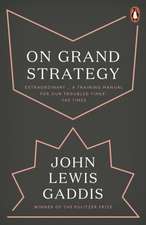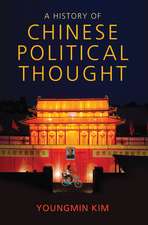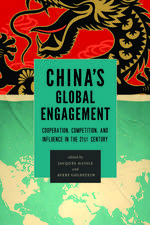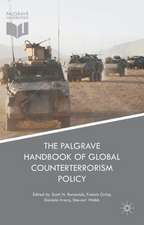The Rise and Fall of Peace on Earth
Autor Michael Mandelbaumen Limba Engleză Paperback – 20 ian 2021
| Toate formatele și edițiile | Preț | Express |
|---|---|---|
| Paperback (1) | 117.22 lei 10-16 zile | |
| Oxford University Press – 20 ian 2021 | 117.22 lei 10-16 zile | |
| Hardback (1) | 124.04 lei 10-16 zile | |
| Oxford University Press – 9 mai 2019 | 124.04 lei 10-16 zile |
Preț: 117.22 lei
Preț vechi: 131.17 lei
-11% Nou
Puncte Express: 176
Preț estimativ în valută:
22.44€ • 24.38$ • 18.86£
22.44€ • 24.38$ • 18.86£
Carte disponibilă
Livrare economică 20-26 martie
Preluare comenzi: 021 569.72.76
Specificații
ISBN-13: 9780197533161
ISBN-10: 0197533167
Pagini: 232
Dimensiuni: 226 x 145 x 18 mm
Greutate: 0.3 kg
Editura: Oxford University Press
Colecția OUP USA
Locul publicării:New York, United States
ISBN-10: 0197533167
Pagini: 232
Dimensiuni: 226 x 145 x 18 mm
Greutate: 0.3 kg
Editura: Oxford University Press
Colecția OUP USA
Locul publicării:New York, United States
Recenzii
This book addresses the most critical foreign relations question of our times: is the post-Cold War era of peace over and conflict resurfacing? Mandelbaum expertly probes the threats and prospects.
In this fascinating study, Mandelbaum takes dead aim at the Wilsonian foreign policy optimism of the pre-Trump era. He argues that the post-Cold War quarter-century was indeed unusually peaceful, due to US predominance combined with the spread of market democracies, but that this liberal democratic peace has now broken down with the rise of revisionist authoritarian powers in each major region. His conclusion is thought-provoking and distinct: the democratic peace is real yet cannot be imposed.
Mandelbaum has never shied away from tackling the big questions in international politics, and he never fails to offer lucid, compelling answers. In The Rise and Fall of Peace on Earth, he asks why peace reigned for twenty-five years after the end of the Cold War in 1989 and why it has now begun to fray in three critical regions: Europe, East Asia, and the Middle East. His incisive explanation is presented, as always, in elegant prose.
Exceptionally wise, erudite and compelling, Mandelbaum has produced the definitive record of the rise and fall of the 'deep peace.' Masterful in its historical command and judicious in the strategic lessons to be drawn, he offers cause for hope and dismay to advocates of liberal democratic capitalism everywhere. The formula for peace that works best is one the US cannot install where it is needed most. A must-read volume.
Writing with a rare combination of equanimity and incisiveness, Mandelbaum shows that while the spread of freedom and democracy around the globe has been very much to America's advantage, the United States is poorly equipped to foster the cluster of norms, habits, and institutions on which they depend in the authoritarian states currently destabilizing the international order.
The Rise and Fall of Peace on Earth will help any reader understand what has happened in world affairs in recent decades, what is happening today, and what possibilities exist on the horizon... Mandelbaum's analysis helps to distill patterns and trends from the near chaos of daily headlines.
Michael Mandelbaum is one of the most lucid American commentators on international affairs. His books are thought-provoking, even when one does not agree with him. He has an enviable knack of explaining complex matters in crisp and sometimes witty prose."
In this fascinating study, Mandelbaum takes dead aim at the Wilsonian foreign policy optimism of the pre-Trump era. He argues that the post-Cold War quarter-century was indeed unusually peaceful, due to US predominance combined with the spread of market democracies, but that this liberal democratic peace has now broken down with the rise of revisionist authoritarian powers in each major region. His conclusion is thought-provoking and distinct: the democratic peace is real yet cannot be imposed.
Mandelbaum has never shied away from tackling the big questions in international politics, and he never fails to offer lucid, compelling answers. In The Rise and Fall of Peace on Earth, he asks why peace reigned for twenty-five years after the end of the Cold War in 1989 and why it has now begun to fray in three critical regions: Europe, East Asia, and the Middle East. His incisive explanation is presented, as always, in elegant prose.
Exceptionally wise, erudite and compelling, Mandelbaum has produced the definitive record of the rise and fall of the 'deep peace.' Masterful in its historical command and judicious in the strategic lessons to be drawn, he offers cause for hope and dismay to advocates of liberal democratic capitalism everywhere. The formula for peace that works best is one the US cannot install where it is needed most. A must-read volume.
Writing with a rare combination of equanimity and incisiveness, Mandelbaum shows that while the spread of freedom and democracy around the globe has been very much to America's advantage, the United States is poorly equipped to foster the cluster of norms, habits, and institutions on which they depend in the authoritarian states currently destabilizing the international order.
The Rise and Fall of Peace on Earth will help any reader understand what has happened in world affairs in recent decades, what is happening today, and what possibilities exist on the horizon... Mandelbaum's analysis helps to distill patterns and trends from the near chaos of daily headlines.
Michael Mandelbaum is one of the most lucid American commentators on international affairs. His books are thought-provoking, even when one does not agree with him. He has an enviable knack of explaining complex matters in crisp and sometimes witty prose."
Notă biografică
Michael Mandelbaum is the Christian A. Herter Professor Emeritus of American Foreign Policy at The Johns Hopkins School of Advanced International Studies and the author of sixteen books, including Mission Failure, The Ideas That Conquered the World, The Meaning of Sports, The Frugal Superpower, and That Used to Be Us (with Thomas L. Friedman).














![American Military Life in the 21st Century [2 Volumes]: Social, Cultural, and Economic Issues and Trends](https://i3.books-express.ro/bt/9781440855184/american-military-life-in-the-21st-century-2-volumes.jpg)








